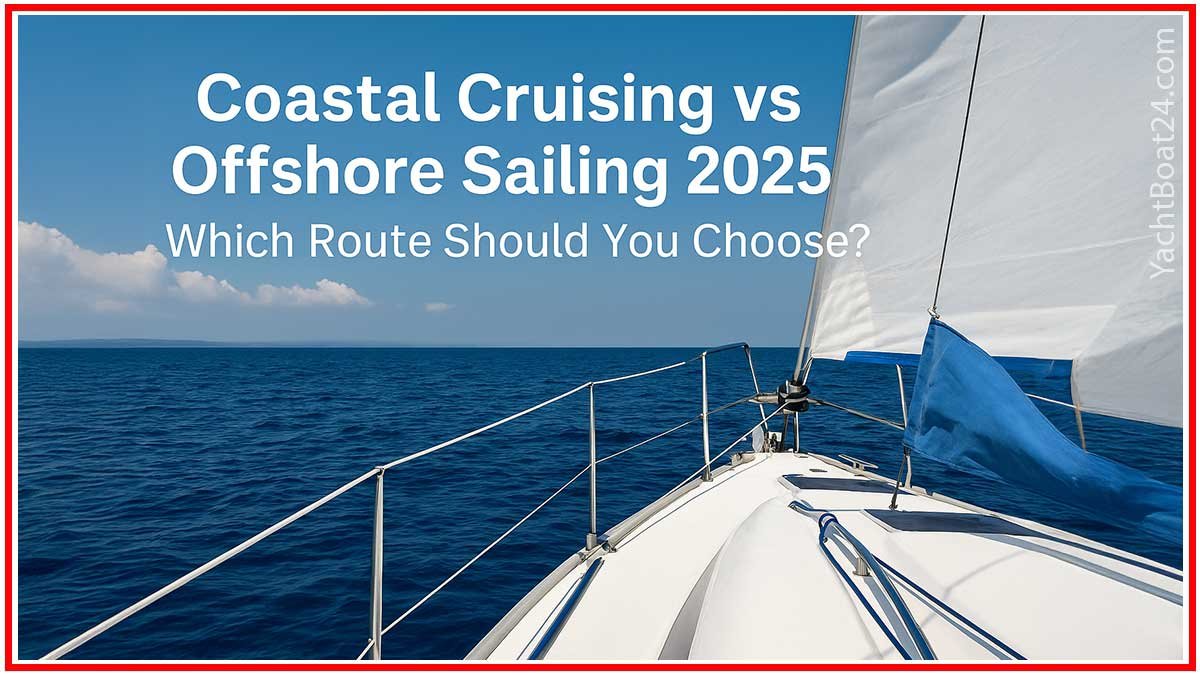Table of Contents
Introduction: The Timeless Question of Route Choice
Coastal cruising vs offshore sailing, when you stand on the bow as the harbor fades in the distance, that moment carries more meaning than just departure—it marks a choice. Do you follow the coast’s familiar rhythms, hopping between anchorages, towns, and sunsets? Or do you punt toward the horizon, trusting navigation electronics and your own seamanship in the open sea? The question of coastal cruising vs offshore sailing has been debated since yachts first cleaved waves. In 2025, modern autopilots, satellite weather updates, and advanced communications have made both options accessible—but your decision remains deeply personal. This is not just a comparison; it’s a journey of self-discovery on water.
The Spirit of Coastal Cruising
Coastal routes wrap you in variety: cultural landmarks, shifting tides of small towns, the laughter of locals recalling sea stories. In a single day, you might set anchor near a medieval lighthouse, spend the evening at a seafood tavern, and rise to kayak through sea caves. This charm means that coastal cruising vs offshore sailing isn’t just about safety—it’s about living in vivid color, unhurried yet alive. Knowing there is always a safe haven nearby offers comfort, especially for less experienced sailors. You connect with landscapes and communities, creating memories rooted in both sea and shore.
The Allure and Demands of Offshore Sailing
But when you break free from shore and feel the bow slip into open water, another world opens. The night sky above, illusion-free horizons, and the pulse of the sea remind you that you are alone in a vast expanse. Offshore sailing is raw and unfiltered—requiring sturdy routine, careful watches, and trust in your vessel and crew. It demands knowledge of weather patterns, currents, and celestial navigation. Yet this very challenge is the key to why many choose it—a chance to explore, to strip away the noise, and to test their resilience. For those deciding between coastal cruising vs offshore sailing, this is the heart of the divide.
Navigational Complexity and Safety Considerations
Modern tools—GPS, AIS, satellite communication—help, but even the best gear can’t overrule conditions you didn’t expect. Onshore, rocks, shoals, and other boats press claustrophobic yet tangible risks. Offshore, the sea’s expanse holds freedom but isolates you from help. You must master route planning, understand tidal flows, and prepare for systems failures. Testing both modes in varied conditions builds versatility. The right choice depends less on route type and more on how deeply you’ve studied maritime safety and navigation.
Psychological and Emotional Dimensions
The sea doesn’t only test our skills—it reveals our internal rhythms. Coastal cruising offers familiarity and flexibility. There’s always land in sight, there’s the option to stop, to adjust, to pause and breathe. For many, this provides a sense of control and calm. The emotional comfort of having an anchorage a few miles away can make a huge difference, especially for families or newer sailors.
In contrast, offshore sailing demands surrender. Once land slips over the horizon, there’s no turning back easily. But in that vastness lies freedom—a meditative solitude that can’t be replicated. Some find this deeply therapeutic, a reset button far from digital noise and human chaos. Others may struggle with isolation or sleep-deprived nerves. The decision between coastal cruising vs offshore sailing may boil down to personality: do you find peace in control, or do you thrive in letting go?
Budget, Time, and Practical Logistics
Coastal cruising can appear costlier—more marina fees, more fuel stops, frequent provisioning. Yet its incremental nature allows you to scale expenses and stop when needed. It suits weekenders, retirees with leisure time, and travelers who want to explore at their own pace. Navigation is simpler, daily plans more predictable, and emergency support is more accessible.
Offshore sailing, while potentially cheaper in terms of ports and fuel, requires investment in gear: life rafts, satellite comms, emergency beacons, storm sails, and more. Insurance for offshore routes is also pricier. And the time commitment is significant—a multiday passage requires solid blocks of availability, including pre- and post-voyage recovery. Yet for those prepared, it’s a rewarding and efficient way to cover vast distances.
So when choosing coastal cruising vs offshore sailing, you’re also asking yourself: What’s my time worth? What pace do I want?
Mixed Strategies and Hybrid Routes
Who says you must choose one or the other? The truth is, many sailors blur the line beautifully. Perhaps you coastal cruise through the day, find an anchorage at dusk, then set off for a night passage across a channel. Or you start with coastlines to build confidence and later take longer leaps offshore. Many experienced sailors create seasonal strategies: coastal cruise in the Mediterranean, offshore to the Caribbean, then coastal again through the islands.
Your own coastal cruising vs offshore sailing path may evolve over years, shaped by growth, circumstance, and desire. That flexibility is the true gift of modern sailing.
Final Thoughts: Your Route Is Your Story
The sea doesn’t care whether you hug the shore or sail into the blue—it will greet you the same way. The difference lies in how you want to experience that greeting. Do you want company, variety, and daily choice? Or do you seek uninterrupted solitude, deeper self-reliance, and the untamed rhythm of offshore time?
Choosing between coastal cruising vs offshore sailing is not a final decision—it’s a framework for experience. Try both. Mix them. Adapt. Let your own story chart the course.
Video – Coastal Cruising vs Offshore Sailing
FAQ – Coastal Cruising vs Offshore Sailing
This website offers general information for your convenience. YachtBoat24.com makes no warranties, either express or implied, and all use of this site is at your own risk. We are not responsible for third-party content linked to or from this site.

